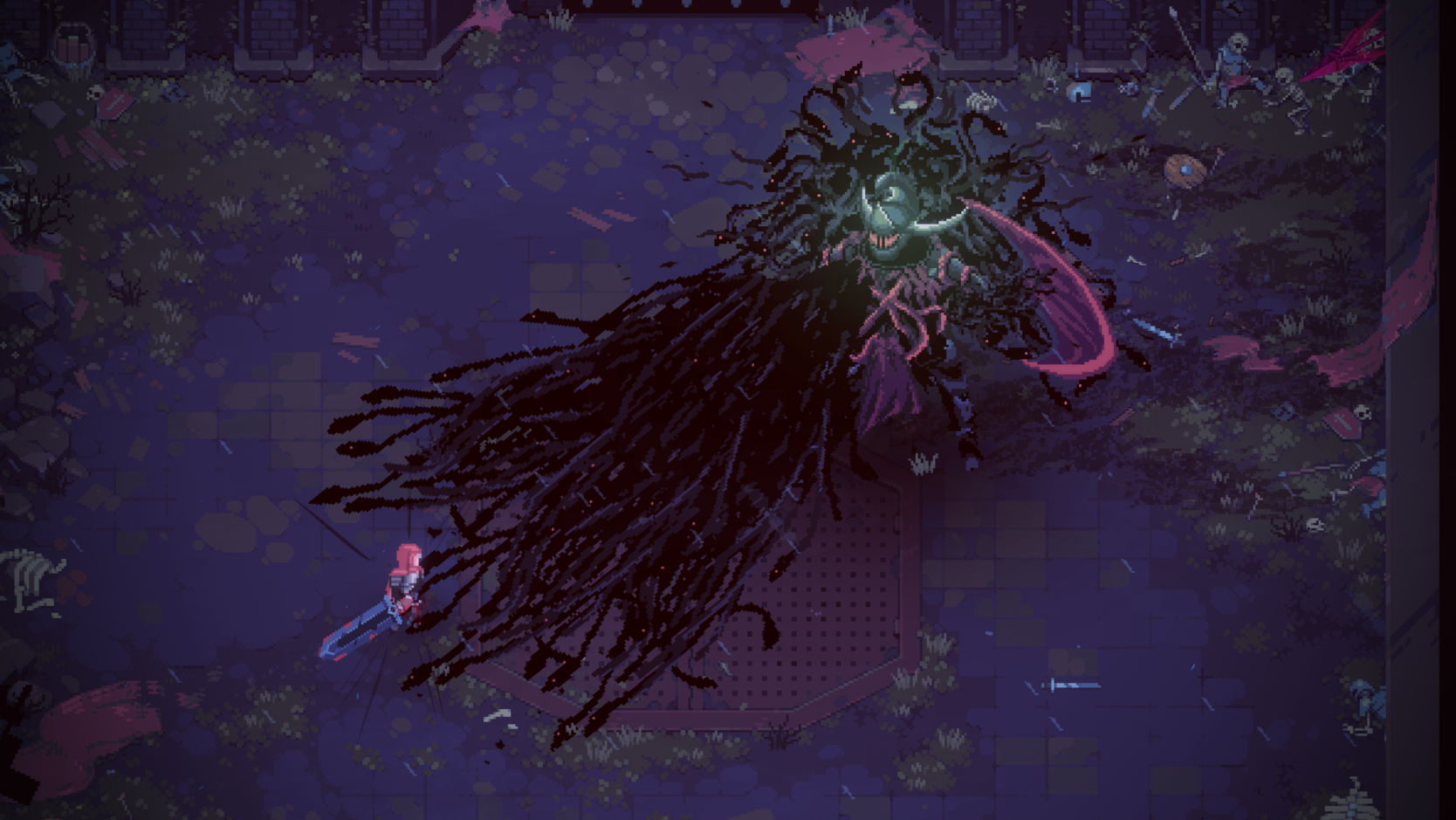There’s no shortage of games that get lumped into the “Souls-like” subgenre of grueling and unforgiving RPGs that were inspired by Dark Souls, but few of them have a unique twist on the gameplay and mechanics like Eldest Souls.
As the first title from the European indie devs at Fallen Flag Studio, Eldest Souls is a pixel art boss rush comprised entirely of chaotic and challenging battles against the mightiest of enemies. While not quite as bleak and gothic as the Souls games, the atmosphere in Eldest Souls can be every bit as intimidating as Lordran, thanks largely to the score from industry newcomer Sergio Ronchetti.
SPIN caught up with Ronchetti via Zoom to discuss his heavy metal roots, adapting his musical skills to the video game world, and much more.
SPIN: What would you want people to know and take away from the Eldest Souls soundtrack?
Sergio Ronchetti: That is my first project, and I’m glad I didn’t fuck it up. [Laughs.] From a musical point of view, the game has two messages I feel needed conveying. One of them was the brutal, fast-paced action of the boss fights, and the aggression and the tension that you should feel during such a difficult game. It should remind you of playing games like Dark Souls, Bloodborne, and stuff like that. Every fight is a struggle, so it should be a relief when the music stops and you know you finally conquered this insurmountable challenge. That was really driven by a heavy orchestral kind of vibe. The other message was the idea of loneliness and hope, which is what the protagonist is feeling at that moment. You’re the last hope for mankind and all that jazz, so that’s one of the reasons why there’s no music in between the fights. It’s to remind you of how alone you are on this journey. The main theme was my attempt at making the soundtrack feel like it was all part of the same coherent vision, because every fight and every boss is so different. Their songs had to be stylistically different, and there’s no music in between them other than the main title theme.
And what was it like to balance those worlds, where you have this overarching dark and ominous environment, but so many of the bosses don’t fall into that same type of feeling?
A few years ago, I went to a video game exhibition at the Victoria and Albert Museum in London, and they had a little section on Bloodborne. They had manuscript paper from the recording sessions they did at Abbey Road, and I remember hearing some of the composers talk about how they cut out some of the high instruments — like you won’t hear any trumpets or anything too bright — because it doesn’t go with that sinister, dark vibe. I decided to do the same thing, No trumpets, flutes, or anything whimsical that just wouldn’t fit that dark, heavy vibe. Then it’s really just making sure that I focused on the story that I was telling, because my job as a game composer is to tell the narrative through audio, whereas the game designers use code and programming to do that. It could be as simple as a big and slow boss having big and slow music, but I also wanted to capture each boss’s personality to help the player with what they should be feeling. Are they aggressive? Are they meant to be a little bit creepy? Through the process, I learned what sounded good, what worked, and what fit the tone as well. We tried to go super dark — like the whole Bloodborne style with Gothic choirs and stuff — but it wasn’t quite right for a pixel art game. We went for realism, but also appreciating and reflecting the fact that it’s pixel art.
Considering that this wasn’t just your first project, but the first release for Fallen Flag Studio, how did it feel to have this brand new team all working together?
It was perfect, because no one looked stupid in front of anyone. There was a lot of “I don’t know how to do this, so I should probably learn how to do this. I’ll do that now.” I don’t believe in luck, because that sets people up to not proactively do anything in life, but I do believe in coincidence — and it was a very serendipitous moment when I met these guys. I knew how to write music, they knew how to code, but none of us had ever made a game before. It was a perfect learning situation where we had space to try things that didn’t work, and we’d learn together what was expected of us within our roles in an indie game studio. It was fun because we were learning and discovering things as we went, like “Hey I just discovered this, and I think it’s gonna make our lives easier.” We’d try it and go from there. It was also very difficult at times, and we learned a lot of lessons that we can’t wait to apply to the next project.
Seeing as you come from a heavy metal background, how different was it to compose for a game instead of playing with a band?
I played bass, and as a good bassist, I would always make sure that I didn’t stick out too much — that I was supporting everybody else without taking any of the limelight. My favorite compliment at the end of the show was somebody saying “Your band sounded so cool and heavy!” Because if they think my bass guitar sounds good, then in the back of my head, I’m like “Maybe I’m too loud…” Composing for video games and film, you want to enhance what’s there without pulling people out of the emotion or distracting them from where they should be focusing. I feel like I’m still a bassist, just with different tools. From a writing point of view, I never learned how to orchestrate stuff. I was never classically trained. I didn’t go to uni. I get my writing chops from listening to my favorite games and playing my favorite games. And I still think like a metal musician, so I’m asking “How can I make this as heavy as possible?”





